
Education and Training in Autism and Developmental Disabilities
Scope & Guideline
Advancing Knowledge for Autism and Developmental Disabilities
Introduction
Aims and Scopes
- Evidence-Based Interventions:
The journal publishes research on a wide range of evidence-based interventions that target educational, social, and behavioral skills for individuals with autism and developmental disabilities. - Inclusive Education Practices:
A strong emphasis is placed on inclusive educational practices, exploring methods to integrate students with autism into mainstream educational settings. - Teacher Training and Professional Development:
Research that focuses on the preparation and ongoing professional development of educators working with students with autism and developmental disabilities is a core area of interest. - Communication and Language Development:
The journal explores various strategies for enhancing communication skills and language development among individuals with autism, including the use of assistive technology. - Social Skills and Behavioral Interventions:
There is a consistent focus on interventions aimed at improving social skills and addressing behavioral challenges faced by individuals with autism. - Family and Caregiver Support:
The journal also addresses the importance of supporting families and caregivers of individuals with autism and developmental disabilities, including training and resources.
Trending and Emerging
- Technology-Enhanced Learning:
There is a notable increase in research exploring the use of technology, such as online interventions and assistive devices, to facilitate learning and communication for individuals with autism. - Focus on Transition Services:
An emerging theme is the emphasis on transition services for adolescents and young adults, addressing their movement from educational settings to independent living and vocational opportunities. - Cultural and Contextual Considerations:
Research that examines the cultural relevance and contextual factors influencing interventions and educational practices has gained prominence, highlighting the need for culturally responsive approaches. - Interdisciplinary Approaches:
There is a growing trend towards interdisciplinary research that combines insights from special education, psychology, and health to create comprehensive support systems for individuals with autism. - Social-Emotional Learning:
An increasing focus on social-emotional learning strategies indicates a shift towards holistic development, recognizing the importance of emotional and social competencies alongside academic skills.
Declining or Waning
- Traditional Behavioral Approaches:
There appears to be a waning emphasis on traditional behavioral approaches, such as discrete trial training, as newer, more integrative methods gain traction. - Generalized Academic Interventions:
The frequency of publications solely focused on generalized academic interventions (e.g., reading or math without specific adaptations for autism) has decreased, reflecting a shift towards more tailored, individualized strategies. - Single-Focus Studies on Specific Disabilities:
Research that targets very specific disabilities or singular interventions without considering broader educational contexts or collaborative approaches seems to be less prevalent.
Similar Journals
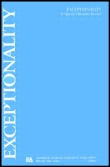
Exceptionality
Transforming understanding of educational diversity.Exceptionality is a prestigious peer-reviewed journal published by Routledge Journals, Taylor & Francis Ltd, dedicated to advancing the understanding of exceptional individuals within the fields of developmental and educational psychology. With an ISSN of 0936-2835 and an E-ISSN of 1532-7035, the journal has established itself as a critical resource for researchers, educators, and practitioners interested in exploring the complexities of exceptionalities across various educational settings. Recognized in the Q2 category in both Developmental and Educational Psychology and Education for 2023, and ranking in the upper percentiles of Scopus' education and psychology categories, Exceptionality offers valuable insights through rigorous research and innovative methodologies. Although it is not an open access journal, its articles are accessible through academic libraries and institutional subscriptions, fostering research and collaboration in understanding and supporting individuals with exceptional needs. Since its inception in 1990, the journal continues to attract high-quality contributions, making it an indispensable publication for anyone interested in the nuances of exceptionality and its implications for education and society.
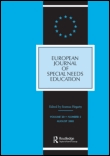
European Journal of Special Needs Education
Elevating special needs education through collaboration.European Journal of Special Needs Education is a prestigious publication dedicated to advancing knowledge and research in the field of special needs education. Published by Routledge Journals, Taylor & Francis Ltd, this journal serves as a vital platform for researchers, educators, and practitioners to share innovative ideas and findings that address the complexities of special education in diverse contexts. With an impressive standing in academic circles, it holds a Q1 ranking in both Education and Health Professions, alongside a Q2 ranking in Developmental and Educational Psychology, reflecting its broad impact and relevance. The journal has been in publication since 1986 and continues to attract a wide readership, supported by its rigorous peer-review process. While currently not an open-access journal, it provides a rich repository of scholarly articles aimed at enhancing education for individuals with special needs, ensuring that its contributions are both meaningful and accessible to those dedicated to improving educational outcomes. The European Journal of Special Needs Education embraces a multidisciplinary approach, fostering dialogue among professionals in education, psychology, and health, ultimately shaping policies and practices for a more inclusive society.
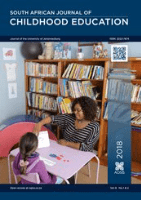
South African Journal of Childhood Education
Unlocking potential in childhood education through open access knowledge.South African Journal of Childhood Education, published by AOSIS, serves as a crucial platform for the dissemination of research focused on early childhood education and developmental psychology in South Africa and beyond. With an Open Access model initiated in 2011, it ensures that valuable insights and findings are accessible to a broad audience, fostering collaboration and innovation in educational practices. The journal's impact in the field is reflected in its rankings, placing it in Q3 and Q4 categories for Education and Developmental and Educational Psychology, respectively. It ranks at #824 out of 1543 in Social Sciences - Education and #240 out of 360 in Psychology, highlighting its relevance and academic rigor. By bridging theoretical perspectives with practical implications, the journal aims to advance understanding in childhood education, making it an essential resource for researchers, educators, and students committed to improving educational outcomes in early development.

Journal of Behavioral Education
Innovating Practices in Developmental PsychologyThe Journal of Behavioral Education, published by SPRINGER, is a prestigious academic journal that serves as a vital resource for researchers and practitioners in the fields of developmental and educational psychology. Established in 1991, this journal has consistently contributed to the understanding of behavioral education through innovative research, theories, and practices. With an impressive Q1 ranking in Education and a Q2 ranking in Developmental and Educational Psychology, it is recognized for its significant impact, achieving a percentile rank of 78th in Social Sciences (Education) and 67th in Psychology. While the journal does not currently offer open access options, it is committed to disseminating high-quality studies that advance educational practices and enhance learning outcomes. The Journal of Behavioral Education is an essential publication for anyone dedicated to advancing knowledge in educational psychology and behavioral interventions.
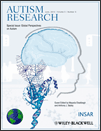
Autism Research
Advancing knowledge, transforming lives in autism research.Autism Research, published by WILEY, is a premier academic journal dedicated to advancing the understanding of autism spectrum disorders (ASD) through high-quality research and clinical studies. With the ISSN 1939-3792 and E-ISSN 1939-3806, this journal has been integral to the field since its inception in 2008 and has been consistently ranked in the Q1 quartile across categories such as Genetics (clinical), Neurology (clinical), and various facets of Neuroscience. Holding prominent Scopus ranks, including #18 in Genetics (clinical) and #26 in General Neuroscience, Autism Research provides a vital platform for researchers, clinicians, and students alike to disseminate innovative findings and foster collaborations aimed at improving diagnosis and treatment strategies for individuals with autism. While not an open access journal, it offers a blend of insightful articles and impactful research that is essential for professionals seeking to stay at the forefront of this rapidly evolving field.

Revista de Educacion Inclusiva
Exploring new horizons in inclusive educational strategies.Revista de Educacion Inclusiva, published by UNIV ALMERIA, is a prominent academic journal dedicated to the field of inclusive education. With the ISSN 1889-4208 and E-ISSN 1989-4643, this journal has been a pivotal resource since its establishment, operating as an Open Access platform since 2008. The journal aims to disseminate high-quality research that fosters an inclusive educational environment, encouraging contributions from researchers, educators, and practitioners worldwide. Located in the vibrant academic setting of Almeria, Spain, the journal serves as a crucial outlet for innovative ideas and practices in inclusive education, helping to shape policies and improve educational outcomes for diverse student populations. Whether you are a researcher seeking the latest studies or a professional looking to enhance your understanding of inclusion in educational settings, Revista de Educacion Inclusiva is an essential resource in this evolving field.

PSYCHOLOGIE IN ERZIEHUNG UND UNTERRICHT
Fostering interdisciplinary dialogue for educational advancement.PSYCHOLOGIE IN ERZIEHUNG UND UNTERRICHT, published by ERNST REINHARDT GMBH CO VERLAG, serves as a pivotal platform for research in the fields of Developmental and Educational Psychology. Since its inception, this esteemed journal has focused on disseminating groundbreaking insights and innovative practices from 1996 to the present, with expectations to continue through 2024. Despite its current ranking of Q4 in category quartiles and a Scopus rank of #309 out of 360, the journal remains a crucial resource for scholars, educators, and practitioners seeking to enhance their understanding of psychological principles within educational contexts. Situated in the vibrant academic landscape of Germany, the journal emphasizes both theoretical and practical perspectives, motivating interdisciplinary discussions that are vital in addressing contemporary challenges in education and human development. As the journal continues to evolve, it invites contributions that explore emerging trends, providing a rich source of information for both researchers and professionals dedicated to improving educational outcomes through psychological insights.
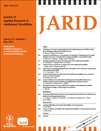
JOURNAL OF APPLIED RESEARCH IN INTELLECTUAL DISABILITIES
Bridging Theory and Practice in Disability Research.The Journal of Applied Research in Intellectual Disabilities, published by Wiley, is a pioneering platform dedicated to advancing knowledge and promoting best practices in the field of intellectual disabilities. With an impressive impact factor reflecting its significance—ranking in the Q2 category for Developmental and Educational Psychology and the Q1 category for Education in 2023—this journal serves as an essential resource for researchers, practitioners, and students alike. Its wide contribution to social sciences is evidenced by its high standings in Scopus rankings, positioned at Rank #297 in Education and Rank #103 in Developmental and Educational Psychology. This journal not only fosters innovative empirical and theoretical research but also encourages the dissemination of practical solutions to enhance the quality of life for individuals with intellectual disabilities. With access options available to meet diverse needs, including open access, it strives to make impactful research widely available, bridging the gap between academic research and practical application.
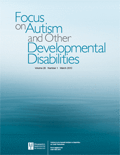
Focus on Autism and Other Developmental Disabilities
Uncovering insights in autism research and practice.Focus on Autism and Other Developmental Disabilities, published by SAGE Publications Inc, is an esteemed academic journal dedicated to advancing the understanding of autism and related developmental disorders. With a significant publication history dating back to 1986, this journal encompasses a wide range of interdisciplinary research, addressing key areas such as cognitive neuroscience, neurology, pediatrics, and mental health. The journal features a robust peer-review process, ensuring the dissemination of high-quality research critical for professionals in the field. While it is not an open access journal, Focus on Autism offers various access options for academic institutions and individuals, fostering an environment of shared knowledge and collaboration. With its recent categorization in the Q2 and Q3 quartiles across multiple fields within medicine and neuroscience, it stands out as a valuable resource for those looking to explore the complexities of developmental disabilities. Researchers, clinicians, and students alike will find this journal to be an essential platform for the latest findings, theoretical discussions, and clinical implications in the domain of autism and developmental disorders.

Analysis of Verbal Behavior
Enhancing understanding of verbal interactions and their implications.Analysis of Verbal Behavior is a premier academic journal dedicated to advancing the understanding of verbal behavior and its applications within various disciplines, including psychology, linguistics, and education. Published by Springer, a prominent name in scholarly publishing, this journal serves as a vital resource for researchers, professionals, and students alike. With an ISSN of 0889-9401 and an E-ISSN of 2196-8926, it is accessible through traditional subscriptions, further enhancing its reach among the academic community. The journal is committed to disseminating high-quality research, including empirical studies, theoretical analyses, and practical applications, thereby contributing significantly to the field of behavior analysis. Scholars looking to stay current on the latest developments and methodologies in verbal behavior will find Analysis of Verbal Behavior essential for their professional and academic pursuits.